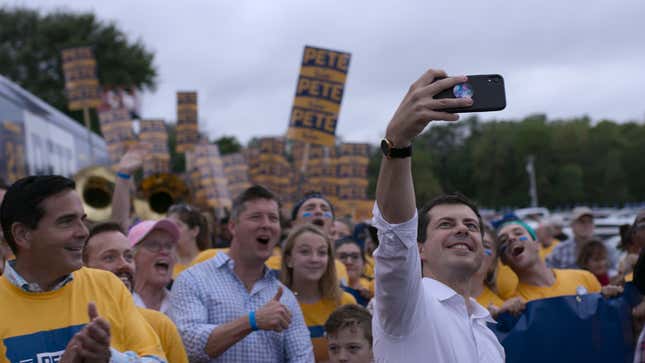Mayor Pete Documentary: If You Squint, You Can See A Human
The new Pete Buttigieg doc mostly serves to illuminate the candidate's great concern for his image
EntertainmentMovies

Jesse’s Moss’s new documentary, Mayor Pete, is revealing in way that feels almost inadvertent. On the surface, this behind-the-scenes chronicle of Pete Buttigieg’s 2019-20 presidential bid is as softball in tone as a pop star documentary—a mere rock doc in nattily bland politician’s clothing.
The film is largely comprised of Pete’s own words and those of the people immediately surrounding him on the campaign trail: his team, led by communications director Lis Smith, and his husband Chasten. Buttigieg seems to be steering the ship, and the ship sometimes circles back in seeming affirmation (plaintive music underscores the Buttigiegs’ reflections of Pete being yelled at by Black people during a town hall in South Bend, Indiana, following the police shooting of Black resident Eric Logan). Mayor Pete contains nary a stray shot of unsanctioned drama—if you aren’t watching closely, you may be lulled into the notion that the doc only exists as an extension of Buttigieg’s campaign. It frequently seems to underscore a message that has already been shoved down America’s collective throat: This public figure who has devoted considerable time to telling the public that he is a good, upstanding person is, in fact, a good, upstanding person. It’s all above the belt, nice, and polite—just a depiction of a steady, softspoken Midwestern public servant attempting to broaden his services.
But viewers should be careful to not spend too much time gazing at the portrait; Mayor Pete is, in actuality, all about the frame. The conversations that happen amongst Buttigieg’s team, spearheaded by Smith, almost entirely concern the commodification of Buttigieg, whose persona consists of uncanny patchwork of vaguely human qualities, right down to his smile that seems to be carved out of foam. Buttigieg, whose centrism is a matter of debate but who nonetheless has attempted to hone as close to the anodyne middle as possible for the sake of public appeal, describes himself at one point as kind of “out there,” which is probably the most out-there thing I’ve ever seen him do. If you played a drinking game in which a shot was taken every time someone discussed Buttigieg’s “authenticity” or his uniqueness, you’d be shitfaced around the 30-minute mark. An example from Smith: “He sounds completely different from everyone else out there…I really really do think it’s as much about his style and about as much as who he is as a person as it is about policy and all that stuff.”
Refocusing your eyes to see the sheen of PR — not as an aesthetic feature of this documentary, but as the text itself — will do wonders for your viewing experience. Moss doesn’t seem to probe Buttigieg too much, and yet the overall effect is to give him enough rope to…not necessarily hang himself, but get a bit tangled up in.
-

-

-

-

-

-

-

-

-

-

-

-

-

-

-

-

-

-

-

-

-

-

-

-

-

-

-

-

-

-

-

-

-

-

-

-

-

-

-

-








































